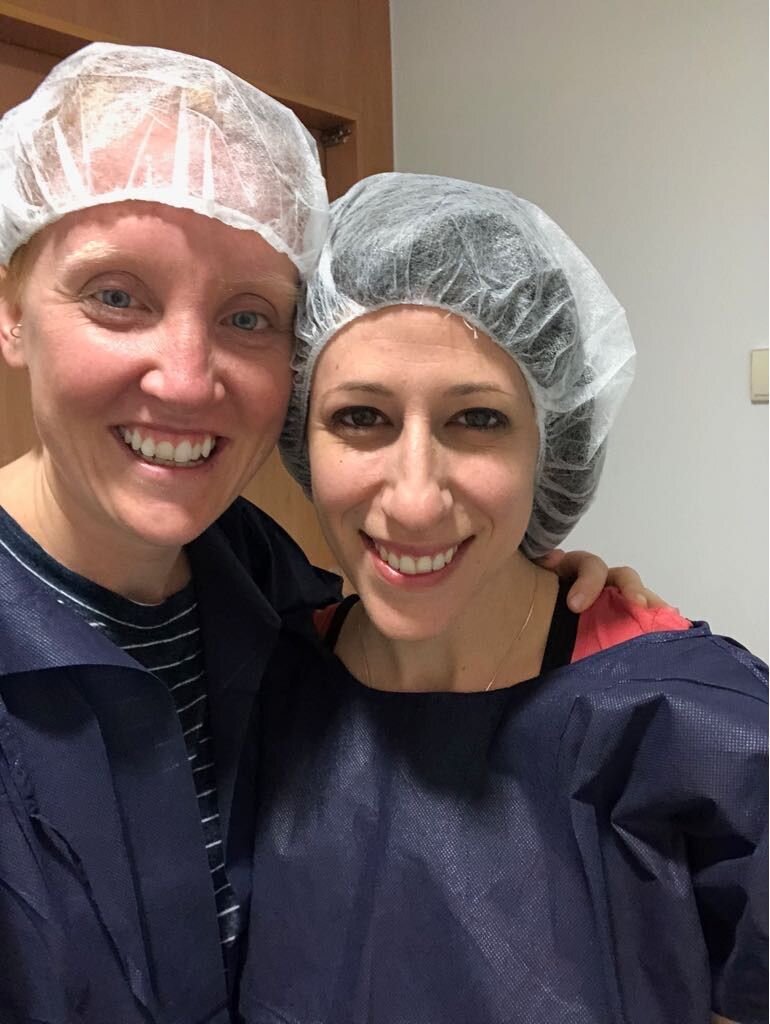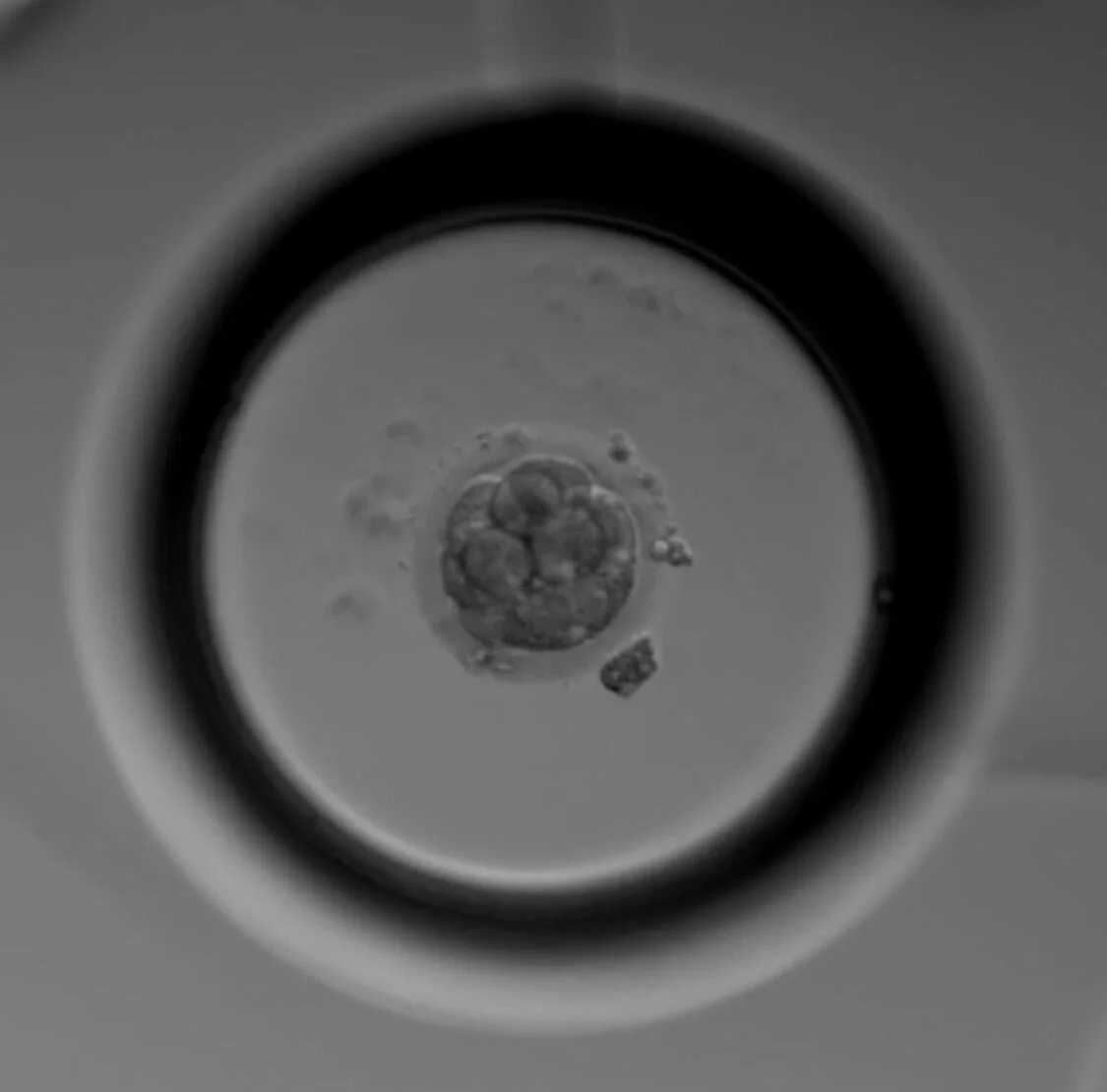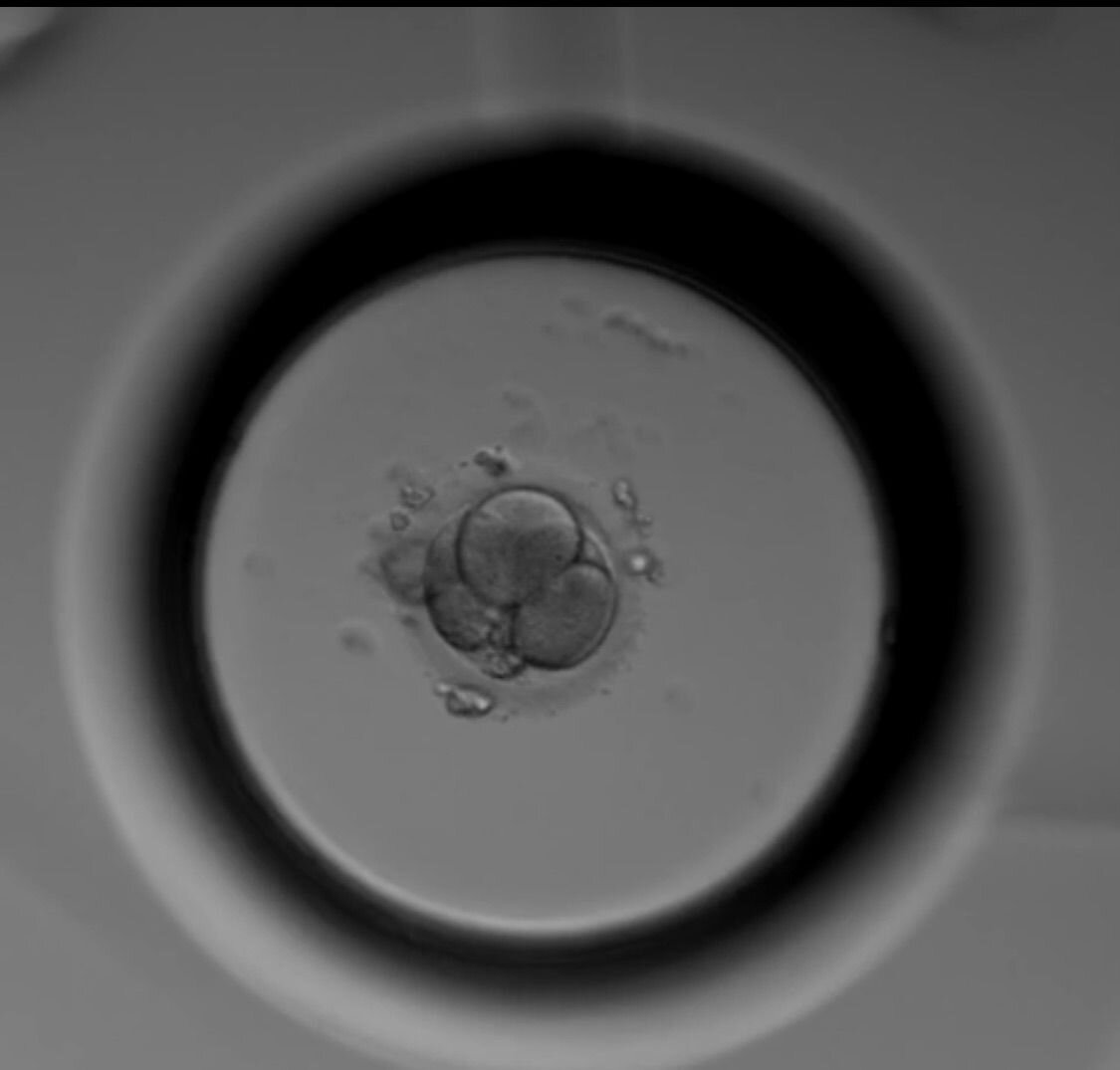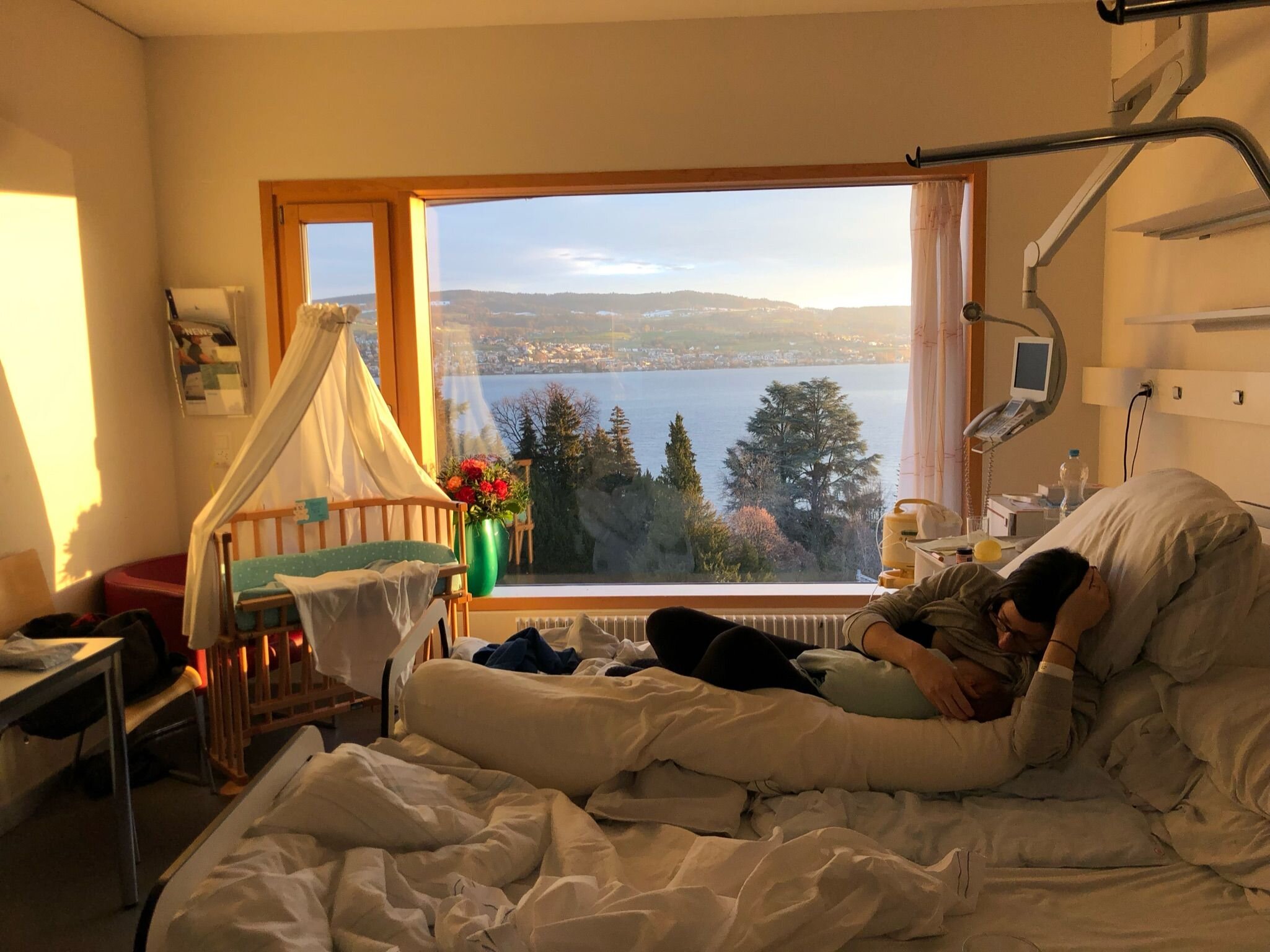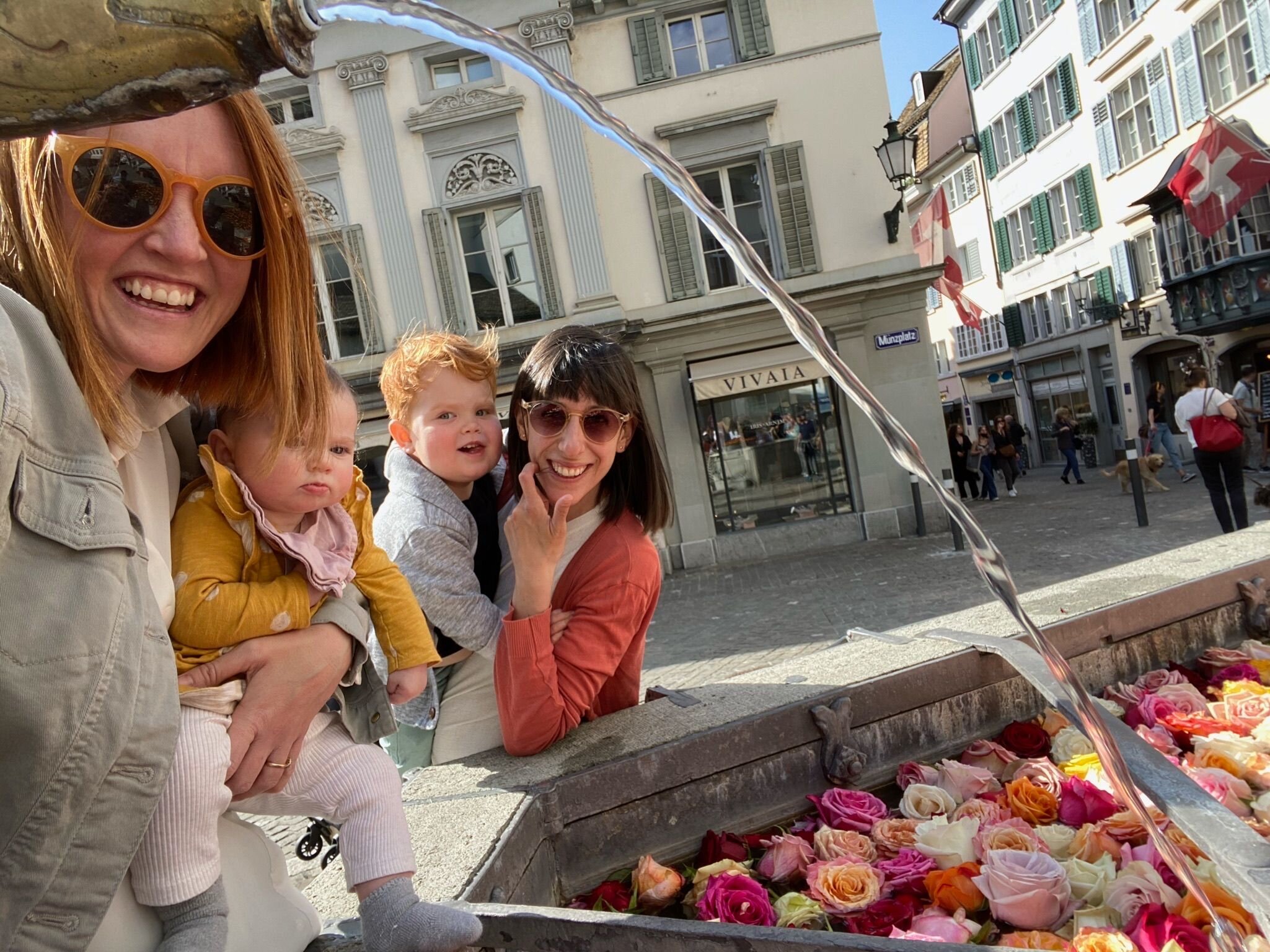Story #105 - Kaitlyn & Rachel, Switzerland/USA - Same Sex Parents, Fertility Treatments, COVID, Induction, Cesarean Section & Postpartum Anxiety
[Kaitlyn]
We both are from the US but moved to Switzerland to teach English right after getting married in 2016. At the time, we weren’t thinking too much about having children, although our friends had warned us that there was no assisted procreation here in Switzerland for same-sex couples. When we were ready to take the leap, we looked around Europe to see where we could get pregnant and first looked into Denmark. We’d hop on a plane when we were ovulating, but working at the same school, there are only so many “sick days” one can take. The stress of having to “hide” it from our boss was challenging.
We decided to give insemination a try first and chose to do it in Austria with a sperm donor, but it was incredibly stressful, and the chances of it working were pretty low. We gave it two tries, but it didn’t work.
Then we looked into Spain and fell in love with their reciprocal IVF program, which means we were able to do the egg retrieval together: same shots, at the same time, and egg retrieval on the same day. I then would carry her embryo and hers, mine. It’s really beautiful. We took birth control to regulate our cycles and keep them at the same time. They also had a sperm catalog, and we spent a lot of time looking into it! We hadn’t been allowed to use the sperm from Austria because the kids can ask about it when they turn 18, which is not allowed in Spain. We thought it was important at the time… not anymore.
When you pick a donor in Spain, they don’t tell you anything but the eye color, blood type, and height. I think we were so invested and already enamored with the reciprocal process that we didn’t even care. We threw seven grants of Austrian sperm down the drain and moved on.
We had a few dramatic days, like when I traveled to Prague with my dad, who was visiting, but needed to get a prescription shot for the egg retrieval and no pharmacy would give it to us. When we finally found one, they refused because they figured out we were a same-sex couple, and we missed the perfect window.
We eventually had to tell our boss because we got the green light from Spain and both needed two weeks off. I think we were both so invested in wanting to build a family that we didn’t care anymore. We went to a clinic in Barcelona and they did the egg retrieval surgery on the same day. I went first, then Rachel. Our kids have the same conception day and same development pattern. They were also frozen together.
We got nervous the first couple of days afterward to see how the embryos would develop. I had more eggs because Rachel could only do lower dose shots due to preexisting concerns. She only had six and out of those, four made it. I had 26.
There’s a law against picking the sex of the baby in Spain, so we didn’t know what we’d have. Then we waited for transfer.
[Rachel]
We always assumed I would go first because I’m older. It made more sense and we never talked about it much.
The implantation is a pretty cool process: they show your uterus on a big screen via an ultrasound wand. They then insert a big needle and implant the embryo on the uterine wall. They also showed us the time-lapse of its development. In a way, it’s our first baby picture!
We got lucky, and it worked.
The pregnancy was fine, but it felt a bit like an alien invasion. I became claustrophobic in my own body. I’m one of those humans who’d do birth any day, but not being pregnant. I had nausea and backaches. I couldn’t eat mayo and cured meat, which was devastating to me. I had to stop working around 27 weeks because my cervix was becoming too thin.
My care here in Switzerland was amazing. The birth was also wonderful, from beginning to end. I gave birth in the most amazing hospital overlooking the lake: it was picture perfect. We called it “the Hotel.” All my midwives spoke English, which I thought was the case for the whole hospital, but no: we just got lucky.
Towards the end of my labor, the baby went into distress and they had to do an episiotomy. It took the doctor an hour and a half to sew me back together. We talked about day brunch in New York: it was fun, but you know… I had just given birth and was on a high of hormones. The hospital was so nice that we begged them to stay an additional night after the baby was born. The birthing room was so picturesque: I was able to move around and laid in this giant tub. We took pictures of the sunrise over the mountain with our new baby. It was so, so lovely.
Unfortunately, I became allergic to the stitches and got the worst infection my midwife had ever seen in 25 years. They had to cut out the stitches one by one because they never disappeared. No anesthetic. Then I had to go back again three weeks later for more. Once, I looked down to see and there was an extra flap. I was like: Is this normal?! I couldn’t move for months and spent three months on my side. After six months, I was still uncomfortable, and I had severe anal fissures that needed fixing. It was so hard.
The postpartum care here is so different. You get sixteen postpartum visits. It’s amazing, so humane. They weigh the baby and check you in your own bed. They came home to check my infection and told me what to do to care for it. They even scheduled my doctor appointments for me.
The parental leave here is 98 days. There is no “paternity” leave, but our school gave Kaitlyn five days. She called after that first week to let them know she couldn’t come back: five days is nothing. So she took another week.
Having a new baby is lonely and a definite learning curve. Most women I know talk about helplessness, and I totally relate: this baby needed me and I couldn’t function. Luckily, he was a pro-feeder, so I spent my days laying on my side in bed, nursing him. I couldn’t do much more anyway and felt incapable of doing anything for myself, for him, or my family. It was frustrating.
Kaitlyn, on the other hand, was incredible: I couldn’t bop him around the room, so she wore him all day, strapped to her chest, and walked with him everywhere.
For the longest time, I couldn’t sit, so I’d have my meals on my side lying down. Her mom came to visit once and my dad too, and we’d all have dinner standing around the kitchen bar, in solidarity!
Mentally, going back to work was hard, and to be honest, it’s all a blur. I was trying to pump at work, but they didn’t have a room for me. There’s not enough bathroom for everyone, so the faculty and children share them. I could have made them do it, but I was just overwhelmed. I’d pump in my car or hide in the girls’ bathroom, but then students would come in and it felt so weird.
[Kaitlyn]
We had a lot of anxiety regarding childcare. Rachel was only working 60%, so figuring out what to do with him was awkward. Care was spread throughout five days, but it’d cost more than her salary. We also needed help short-term because we have summers off. We tried nannies and found an older Swiss lady with her own… quirks. She believed he needed an exorcist because there was a ghost in his bedroom. Many products aren’t the same, and she was suspicious of the lotion and burp cloths that came from the USA: everything was wrong!
In Switzerland, same-sex marriage is not a thing. Around the three-week mark after our son, Finn, was born, the CPS here made us appear in a meeting and they berated us about his origins. Rachel is the only one on the birth certificate because I’m not allowed to be the “father.” So we got flagged in their system and it’s an ongoing issue. We were told it’d be a multiple yearlong battle. They are adamant about finding the anonymous donor and they charge us every second of their time. It’s like being billed for their harassment. In their mind, our son has the right to know his “origins” and we are robbing him of that. We, unfortunately, got an agent who uses the law to enable his homophobic views and uses his power for it.
Switzerland is still very conservative. Women weren’t allowed to vote up until 1992. It’s a direct democracy, so everything takes forever to change. They are currently working towards gay marriage. In Zurich, it’s a little different, but we live in the peripheries, which means the people here are less liberal. They’re interpreting the laws to their advantage to push their agenda.
Every single month for the first year after Finn was born, we went somewhere. We went back to the US three times and my mom also came three times. My brother came, then my dad. We didn’t feel the isolation.
[Rachel]
And I was the postpartum human laying on the sofa! (laugh)
[Kaitlyn]
This year is different… last time we went home was for Christmas 2019. Finn had just turned one, and we told our families: “We’re going to Barcelona [to transfer another embryo] on the way home to Zurich!”
But it was a mistake to be so vocal about it. My mom came with me to care for our son, and I felt a lot of pressure during this trip.
The first IVF transfer didn’t take.
It was a bummer. Because we are teachers with funky leaves, we can only get pregnant at certain times during the year. If your parental leave overlaps during summer break, you get paid less and we couldn’t afford that.
After the first failed transfer, we only had two chances before we’d have to wait god knows how many more months. We thought it’d be impossible to do another transfer the following month because of the hormones, but it somehow magically happened.
We tried a day before I was supposed to have my period. I flew to Spain on my own, and Rachel was very sweet. She sent cured meat and burrata from this awesome restaurant straight to my hotel room the night before the transfer.
The delicious meal did it: I became pregnant.
We were so lucky because it was right as we started hearing about COVID and how serious it could be. I remember getting to the airport to fly back home and think, “Should I be nervous about this?” It was already hitting Italy.
People think that IVF is this magical science that works every time and the first failure was like a cold shower. It makes you think that you’re somehow failing if it does not work. Luckily, it took, and we allowed ourselves to be excited.
Then early March, everything suddenly went into lockdown. We were stuck home, trying to teach with a two-year-old. I was in my first trimester, and I truly felt like I hadn’t processed what happened. I’m a generally happy but anxious person, and with the risk of miscarriage in the first trimester, I was a mess.
I luckily made it to my second trimester, and we decided to move because we needed more space. We switched home during the summer at 100 degrees and a raging pandemic. But we got to experience the lake and it has been lovely.
What Switzerland lacks in inclusion, they make up in natural beauty.
Overall, I really liked being pregnant despite the dietary changes. At about 32 weeks, we discovered the baby was breech. From then on up until the end, she flipped constantly. Sometimes twice a week. I probably had over 30 ultrasounds to figure out where she was in my belly. And each time, she was in the opposite direction. It was maddening: I tried not to fixate on how I wanted my birth to be, but I did.
I really didn’t want a C-section.
Rachel was not able to come with me to any appointment due to COVID. We discussed my options with my doctor but still scheduled a c-section. There was someone who delivered breech babies at another hospital, so we went to see him: he was an asshole. Full of himself. He didn’t believe that she moved so much. It was such a weird situation. We still weren’t sure what we’d decide, so we kept him on the back burner. We didn’t have many choices.
For the following weeks, we spent so much time and energy trying to flip her head-down. I wanted to deliver where Rachel had delivered, and at 39 weeks, when we found out baby was head down, we decided to do an induction: it was that or a scheduled c-section. Either way, I was not going to have the birth I wanted.
The day before the induction, I slept seated by fear she’d flip again. When we got to the hospital, we were so hopeful. Remembering Rachel’s birth, we thought it’d be this lovely and welcoming experience, just like she had. It wasn’t. It was the complete opposite.
I had a different team than she’d have. No one spoke English. We understand basic German, but not medical German. They began the induction process, but I couldn’t understand what they were doing. They stuck something in my vagina. Then, the breech doctor showed up: “I heard you gave up on waiting!” He talked at me for several minutes, telling me how induction wouldn’t work. “You’re going to fail, then you’re going to blame me,” he said. “I told you I could deliver breech babies!”
By the end, I was in full-blown tears.
You want to go into labor feeling strong and ready to go. How I felt was the opposite of that.
The team of midwives was (sort of) supportive of the situation, but I heard him next door yelling, “This annoying American has come here to have a baby and induce!” If only I could have explained to him how little I wanted an induction, I would have. But my doctor had recommended it.
We thought that, by the next day, I’d have given birth. But there, they do the smallest dose of Cervidil then wait 24 hours to see if your body will go into labor on its own. It’s a longer process than in the US. Plus, they wouldn’t let Rachel stay, so there was a lot of sitting around and waiting.
At the time, the COVID measures were at their peak. We had 10 000 cases a day.
They tried that for two days straight. Same medicine. Same dosage. And they wouldn’t let me go home to rest. Everyone and their mother told us on the news to stay home and not be in a hospital if we didn’t have to. When they said they were going to do it for a third day, I refused. And decided to go home.
That’s when the break of trust happened.
Here, doctors don’t deliver you. Midwives do. I called my OB and asked her to explain to me what had just happened. She said that’s what she had supported and if I was not happy, it was my decision to go somewhere else to give birth. So, at 39 weeks, I decided to switch hospital.
My doctor had a relationship there too, but it was really long to be seen. I showed up with my bag because I thought maybe they’d induce me on the first day, but they were too busy. I had to call four days in a row after that, thinking it’d be “The Day.” When it finally was, the baby measured small, so they said, “Okay, let’s induce you.” But they used the same medicine, same dosage. And for four nights this time.
They’re big here about wanting to let your body kick in. But I wasn’t. I spent days and days trying different medicines. What did it was election night in the US. Everybody was waiting. The stress was high. It took forever to get the final results. Then when it was over, and Biden was officially elected on Saturday evening, my body went into labor. It was like, “You can bring another human into the world.”
Rachel came to visit but would have to go home often. My mom came in time for the second induction because we couldn’t find anyone to care for our two-year-old. We thought things were finally happening on Sunday, but I then had 38 more hours of labor. I stayed at 1cm for 20 hours. I screamed for the epidural. I was in full-blown labor, but nothing was happening, so they wouldn’t give it to me. I had tried every drug except the epidural. Everything I said I didn’t want, I had every single one of them.
Finally, I started to progress and they agreed to the epidural, but it didn’t work. I had a “walking epidural” and could move.
I finally got to 10cm, but baby wasn’t moving down. By then, they were upping the Pitocin to the max and after three hours, they suggested a c-section. I had every drug running through my body, and they said, “It’s not safe anymore. There’s meconium. We’re going to let you try to push first, then roll you to the OR if it doesn’t work.” I didn’t want to push. I’d seen Rachel push and I knew it wasn’t supposed to feel like that. But they wanted to allow me to try.
It didn’t work.
By then, I was crying hysterically.
When they strapped me to the table for surgery, I thought, “Just make it stop.”
Rachel paced in the hallway like in a movie while they prepped me, then she was able to come in.
They did the thing. I heard the cry. Then they told Rachel, “Go to baby and cut the cord.”
[Rachel]
Thirty-eight hours of work, and I’m the one to cut the cord. I felt so guilty. And traumatized.
[Kaitlyn]
I was shaking uncontrollably. They wanted to put her on my chest, but I wouldn’t trust myself not to shake off onto the floor. But they did it anyway, and I’m glad. I calmed down as soon as she was put on me.
Ruby is five months and a half now.
I’ve struggled with weight before and had years before my pregnancy feeling pretty good. Ever since I’ve met Rachel, I’ve been more easygoing about food and exercise. No more restriction. I was nervous about the postpartum period due to that. The first few weeks postpartum, the scale was not moving and it drove me crazy. Now, I’m finally seeing some change. My mood is better and I’m trying not to let that mess me up.
Because I’m at a higher risk of postpartum anxiety, I was allowed to get a medical emergency visa for my mom. She’s very present and it was great to have her here, especially after having abdominal surgery. I haven’t gone back to work. There’s a side of me who thinks that, in a not COVID world, it’d be good to be in a classroom and use my brain, but not virtually. I extended my leave up to May 6. I’m hopeful the vaccine will be here. It’s not the case right now. I’m very anxious about that.
Immediately after Ruby’s birth, I waddled over to the pediatrician room in my little slippers. During this five-minute appointment, he said, “Her head is too small. There could also be an EPV, a heart murmur, a sacral indentation in her back, spina bifida, or nothing!” A grocery list. “These are all the things you have to follow up with,” he said, then he sent me back to my room. On my way, a giant clot, the size of a football, fell off me. From that moment on, I just feel like there’s been so much anxiety.
Then a week after she was born, we had multiple visits to the ER: jaundice and a cold from her brother’s daycare. They also sent me a letter with all these things to follow up, appointments dates and I’m not sure what it’s for. I went into these appointments without understanding much because it’s all in German and no one explained. I thought they would do scans, but instead they talked about the brain.
I feel like I didn’t come out for air for six weeks straight. It was absolutely insane.
This is also why I’ve extended my leave: I feel I was robbed from my the beginning of her life and stuck into an anxiety cloud, all while recovering from major surgery and caring for a toddler. It was a big financial hit for us, no question about that, but I’m drowning. I wish I could stay with her until the summer.
I finally called a therapist last week.
Therapy is a good place to put all the complaints when your relationships cannot take it anymore (and you start annoying yourself!)
Because right now, we’re only surviving. We’re lucky we have each other and we’re able to empathize. I’m a little controlling over breastfeeding, but we’re talking about it. I always overprepare and I’m obsessive about supply. Ruby wasn’t gaining weight and was labeled as “failure to thrive.” Many people asked about my milk and I can’t explain how hard it is to hear that.
Luckily, Rachel knows what it is because she also breastfed. Although we had different birthing experiences, I know she understands.
[Rachel]
I wasn’t mentally or physically back to myself up to a year ago. You wonder, “Will my brain ever come back?”
[Kaitlyn]
My hope is that what we shared goes through. We get so stuck in our minds sometimes. I want to go back in time and revisit every step of my birth, needing to know if it was necessary. But ultimately, this is my story. And I’m just trying to make sense of it.

